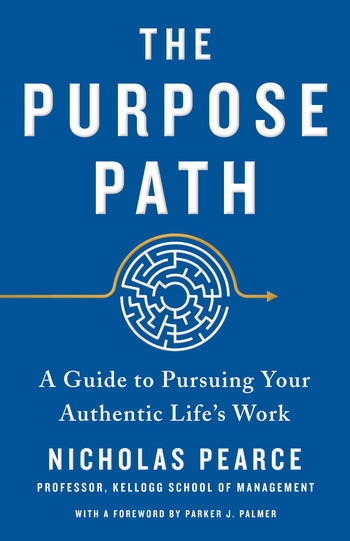Careers Leadership Jun 3, 2019
Are You Doing the Work You Were Meant to Do?
It’s never too late to forge your own path. Here are four steps.

Riley Mann
In his work coaching executives, Nicholas Pearce noticed a pattern.
“Many of them had achieved great things, but at a certain point they looked back and said, ‘What was it all for?’” says Pearce, a clinical professor of management and organizations at Kellogg and author of The Purpose Path: A Guide to Pursuing Your Authentic Life’s Work. “The market applauded them. Wall Street applauded them. But a part of them was dying daily.”
Pearce began to wonder: “How do we reconnect with ourselves and figure out what we’re supposed to be doing?”
That question is at the heart of his new book, The Purpose Path, in which Pearce examines ways to build a career that is both enriching and fulfilling, based on his experiences as a pastor, consultant, and professor.
“This is not about pursuing what others consider success,” Pearce says. “It’s doing what you must do with your life and being faithful to what you believe your calling is. Thus, you’re building a life of significance, not just a life of success.”
Pearce describes steps people can take to find their own “purpose path”—and summon the courage to follow it.
Design Your Own Scorecard
One part of discovering your purpose is defining what success might look like for you—aligning “your role with your soul,” as Pearce puts it. He likens anything else to judging one’s self-worth using someone else’s scorecard.
“People chase after things other people told them they should want,” Pearce says. “It takes a lot of courage to turn away and define how you plan to keep score, even if it doesn’t make sense to anybody else but you.”
One way to build a more meaningful scorecard: When weighing traditional indicators of success, such as salary and title, also account for their drawbacks. Those in high-paying careers are often expected to “sacrifice so much of themselves,” says Pearce, whether by having less leisure time or foregoing a chance to do more fulfilling work. Thus, they should carefully consider whether money and status are adequate compensation for those sacrifices.

The Purpose Path: A Guide to Pursuing Your Authentic Life’s Work is available from Macmillan or wherever books and ebooks are sold.
Read morePearce had to revamp his own scorecard as an undergraduate. While studying chemical engineering at the Massachusetts Institute of Technology, Pearce realized that he was neglecting his deeper calling—becoming a pastor. “I knew I was called to ministry when I was seven years old,” he says. “The question was, would I be courageous enough to pursue that and to live it out?”
Pearce changed course, eventually earning degrees in chemical engineering and management while pursuing a concentration in religious studies from Harvard Divinity School. “I had to really hustle to craft a unique undergraduate education experience that was preparatory for my calling, not just for a lucrative career,” he says.
Identify Your Intrinsic Motivators
Another way to build a better scorecard is to turn inward and identify intrinsic motivators. Pearce identifies three: a sense of autonomy, a sense of mastery, and a sense of purpose.
A sense of autonomy means feeling that you are trusted, which gives you license to explore new opportunities. A sense of mastery relates to your ability to gain and improve skills and expertise in new knowledge areas. A sense of purpose means that you recognize the ways that you are contributing to society. Pearce has found that people today are increasingly paying attention to this motivator.
“My students are really thinking about how they can merge purpose and profit,” he says. “Social good and financial good are not antithetical, but sometimes there is a trade-off. And there are some people who are willing to walk away from certain financial benefits to focus on social good.”
For example, Kellogg alumna Carmita Semaan began a career in global product management after graduating from Kellogg in 2004, but soon found her passion in public education. Dismayed by the lack of diversity in education leadership, Semaan started The Surge Institute in 2014, a leadership development program for educators of color.
“She emptied her bank accounts and drew on her retirement savings because she saw a problem that she had to solve,” Pearce says. “Her story proves that this vocational courage can come at significant personal expense—yet it often comes with the potential of living the life you were uniquely designed to live.”
Reflect with Others
In addition to deep introspection, Pearce recommends talking to mentors, parents, colleagues, and family members, who can help you face your fears and recognize your purpose. “They have the insight and goodwill to guide us and help us see things in ourselves that we often don’t see.”
In The Purpose Path, Pearce describes an exercise known as the “Johari Window,” in which an individual and a peer both select a series of traits that they think describe the person. The exercise can help you recognize core traits and values that you might struggle to articulate on your own.
“Vocational courage can come at significant personal expense—yet it often comes with the potential of living the life you were uniquely designed to live.”
Simple conversations can help, too. When Pearce was a PhD student at Kellogg, he considered pursuing a tenure track position. He recalls speaking with his mentor, Katherine W. Phillips, who reminded him plainly that while he had clear promise as a scholar, he also had a clear calling as a minister. “We see who you are,” Pearce recalls her saying. “When will you acknowledge it?”
Pearce says that the conversation helped him refocus his goals. After completing his doctorate, Pearce became an associate pastor at Chicago’s Apostolic Church of God and started an executive advisory firm, The Vocati Group, as well as joining the clinical faculty at Kellogg.
“That conversation with Katherine produced a degree of fright, but also relief,” Pearce says. “I could take off the mask and no longer feel this tension between presenting the version of myself I wanted them to see and the true self I knew I had inside.”
Consider Starting Small
Pearce says that anyone can begin to reflect on and realign their priorities, no matter their age or career stage.
“It’s not too late,” he says. “People are living longer lives. The idea is not to lament what you haven’t done. It’s to start now and to use whatever life and years you’ve got left to make a difference.”
One thing that often keeps people from pursuing their purpose is the fear of giving up a stable, lucrative career for a not-so-sure bet. But Pearce says that even if you are not ready to make a huge change, a smaller step like volunteering or enrolling in an evening class can often set you on the right path.
“It doesn’t mean that we need to be careless or thoughtless, but sometimes we do need to summon the courage to take the leap, even if that leap means we don’t necessarily quit our job right away,” he says.
However, Pearce is quick to note that finding one’s purpose is not a one-time solution. Rather, the goal should be to create a mindset of being more truthful about what you want for yourself.
“It is a deep soul-searching that you’ll have to ask again and again,” he says. “But there can be a very deep sense of knowing that you’re in the right place, in the right role, at the right time.”



